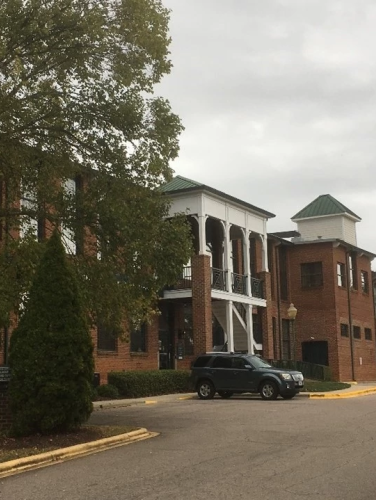
Davidson Cotton Mill
(ca. 1908)
Davidson’s second mill experienced Mecklenburg County’s rise and decline of cotton manufacturing before its rebirth through adaptive reuse.
209 Delburg St, Davidson, NC 28036
Encouraged by the 1874 reactivation of the railroad through the town and the success of the Linden Cotton Mill that opened on Depot Street in 1890, most residents of the small college town of Davidson welcomed additional industrial and manufacturing development as the twentieth century dawned. By 1893, the Linden Mill was running at full capacity and a new cotton gin was under construction on Concord Avenue. They were joined in the late 1890s by the Southern Cotton Seed Oil Company plant and the Davidson Milling Company flour mill. With some 2,000 bales of cotton sold annually in Davidson by the early 1900s, investors soon organized to build a second mill, resulting in the formation of the Delburg Cotton Mill Company in 1907.
Property Quick Links
Upon its completion in 1908, the Delburg Mill building was a modern facility featuring the most technologically advanced equipment of that era, including electric power, automatic fire extinguishers, and exterior fire hydrants. The mill was initially serviced entirely by rail, and loading docks were intentionally oriented towards the rail lines. The mill later had to be modified to accommodate the rise of trucking as the new mode of industrial transportation. The mill’s initial success prompted the need to expand its production facilities by 1914. Davidson’s two cotton mills merged in 1923 to form the Delburg-Linden Company, operating primarily as the spinners of high-grade knitting and tire fabric yarns. Later that year, due to a tenuous post-World War I business environment – including uncertain labor conditions, fluctuating cotton prices, and inflation – the shareholders of the Delburg-Linden Company voted to sell the mill to Martin Cannon of Cannon Mills. Following that transaction, the company was renamed the Davidson Cotton Mill and operations were centralized in the former Delburg facility which, by 1924, was operating nearly 15,000 spindles. The former Linden Mill was closed and used as a cotton warehouse. The company struggled to survive the Great Depression and, despite a run of post-World War II prosperity, closed the mill in 1950.
The mill buildings lay idle for some four years when the Connecticut-based Bridgeport Fabrics purchased the property, using the old mill building to produce webbing and zipper backing until around 1962. The company then closed operations in the mill building, opting instead to produce other products in a new facility that incorporated parts of the cotton mill’s former warehouse/dye house across Delburg Street. The old mill building was used primarily as a warehouse. Davidson College purchased the property in the 1970s, reselling it in 1996 to the Davidson Cotton Mill LLC investment group for an adaptive reuse renovation that included shops, offices, restaurants, and an adjacent condominium complex.
Among the best preserved cotton mill buildings in Mecklenburg County, the Davidson Cotton Mill facilities consist of several brick industrial buildings, including the milling building, cotton warehouses, and the Southern Power Company Transformer House, a rare surviving example of an early 20th century power transmission building.

